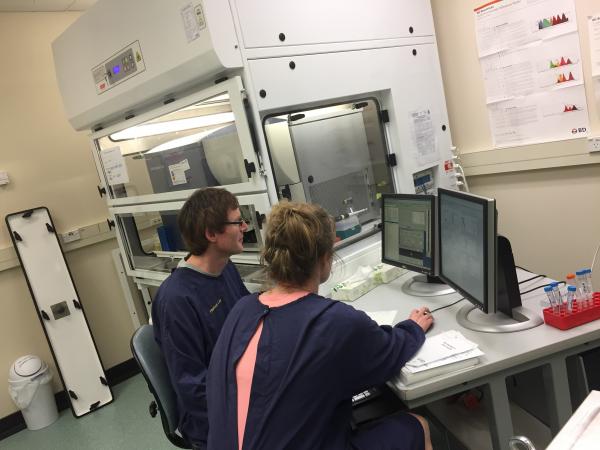Understanding the origins of CRISPR in the humble bacteria

Associate Professor Peter Fineran from the University of Otago is investigating the regulation of the CRISPR-Cas bacterial immune system, which could have far-reaching implications for bacterial evolution and antibiotic resistance
Published 2 November 2017

Associate Professor Peter Fineran with his PhD student Hannah Hampton, are looking at data by flow cytometry - one of the methods involved in the project. Credit: Htin Aung
CRISPR, the sophisticated technology for editing genes making headlines worldwide, originated in bacteria as a type of immune system. We commonly think of bacteria as the germs that cause disease. However, bacteria themselves are continuously under threat from viruses and other invaders. As a result, many bacteria have developed this sophisticated ‘immune system’ to recognise and eliminate foreign genetic material. This system also allows bacteria to develop a ‘memory’ which allows them to recognise and disarm future attacks.
Associate Professor Peter Fineran, from the Department of Microbiology and Immunology at the University of Otago, Associate Professor Paul Gardner and their team, have been awarded a Marsden Fund grant to study how bacteria regulate this immune system. The core of this sophisticated system is CRISPR-Cas. Immunity relies on the bacteria acquiring ‘memory’ sequences from the invader. These sequences then assist bacterial Cas proteins to recognise and destroy the foreign genetic material.
However, the fundamental biology of the regulation of CRISPR-Cas – in particular, how it is regulated to provide a comprehensive defence against foreign genetic material without causing ‘auto-immune’ problems – remains poorly understood.
To address this, Associate Professor Fineran’s team will work with Associate Professor Paul Gardner to develop and employ state-of-the-art methods to unravel the full network of CRISPR-Cas regulatory genes. These genes allow ramping up of the CRISPR-Cas defence when a bacterium is most vulnerable to attack. They also defuse the inherent danger of “autoimmunity” of this system when the host bacterium is not under threat.
By understanding their regulation, CRISPR-Cas systems could be manipulated for improved outcomes, such as limiting the spread and acquisition of antibiotic resistance genes and developing CRISPR-based antimicrobials. This work will provide new insights into one of the hottest topics of modern molecular biology.
